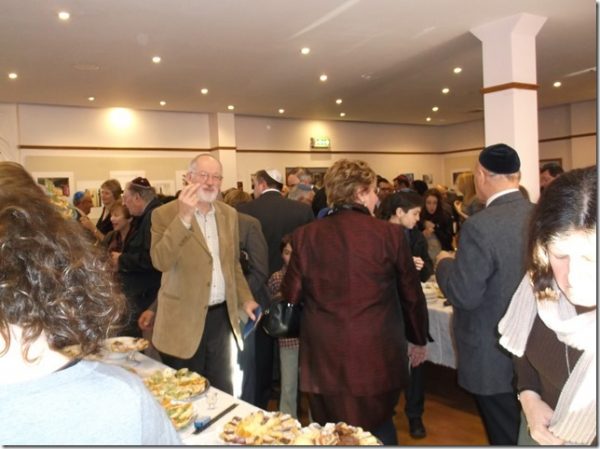
by Michael | May 11, 2018 | Blog
There’s certainly a wedding guest etiquette, but it’s often unspoken. How, then, is one to know what to do and what to avoid?
Some guest etiquette is common sense. But thoughtlessness sometimes enters into it.
I know, as a celebrant, that being a guest can sometimes prove to be less than simple.
If you’re not careful, you can get it wrong – and, potentially, months before the big day!
RSVP
It’s easy to put off responding to the invitation because you’re want to be sure you are free. (Or because you forget about it!). But consider those making the arrangements. They have to book all manner of things (not least, the venue and catering), and this has to be done well in advance. Deposits need to be paid. They need to know numbers fairly soon.
If you’re able, then be one of those who responds as soon as possible.
Tweaking The Invitation
You may want to bring your child(ren), but if there is no mention of them on the invitation, then accept it. (It’s not meant as a snub, but there simply have to be limits on the numbers invited.) Obviously, the same goes for other people you may feel should be invited.
You may have a new partner, but don’t assume you can bring them. (For one thing, you might disrupt the seating plan.)
Participating
You could get asked to take on a role at the ceremony. Maybe as bridesmaid or usher. It’s an honour, so make sure you find out well in advance what the expectations are of your role. Will you have to attend a rehearsal the day or morning before or wear particular attire?
If you don’t want to (or can’t) do it, then give maximum notice Then there’s time to replace you, if necessary.
On the Day – Punctuality
Arrive well (30 minutes?) in advance – and don’t upstage the bride by a tardy, flustered entry. If you have been delayed, then you should simply wait until the end of the ceremony – just don’t interrupt it.
If you’re the Best Man, you should arrive an hour before the ceremony starts. If you’re going to be late, try and call the groom, at least, and warn him.
Dress
You will normally be given guidelines in the invitation. Go with what you are asked to wear, even if you might prefer a different style of attire.
At the Ceremony
Ushers may show you to your seat. If that’s not the case, leave the front two rows free for the family and VIPs.
Is the Ceremony “Unplugged”?
There will probably be an official photographer in attendance and his/her photos will matter a lot to the couple. It would be far better if they could show your smiling face rather than an iPhone held in the air. Take photos after the ceremony, by all means. Always respect any requests in this regard in the invitation or on the day.
Behaviour
It should go without saying that you ought to drink responsibly afterwards (and even more so, if you start before the ceremony!). Likewise, don’t trash the venue or embarrass yourself or the couple by loud or aggressive behaviour.
This is the biggest day in your friends’/relatives’ lives, so be grateful that they have chosen to include you. Enjoy the day – and enhance it for the happy couple. Make them glad they invited you!
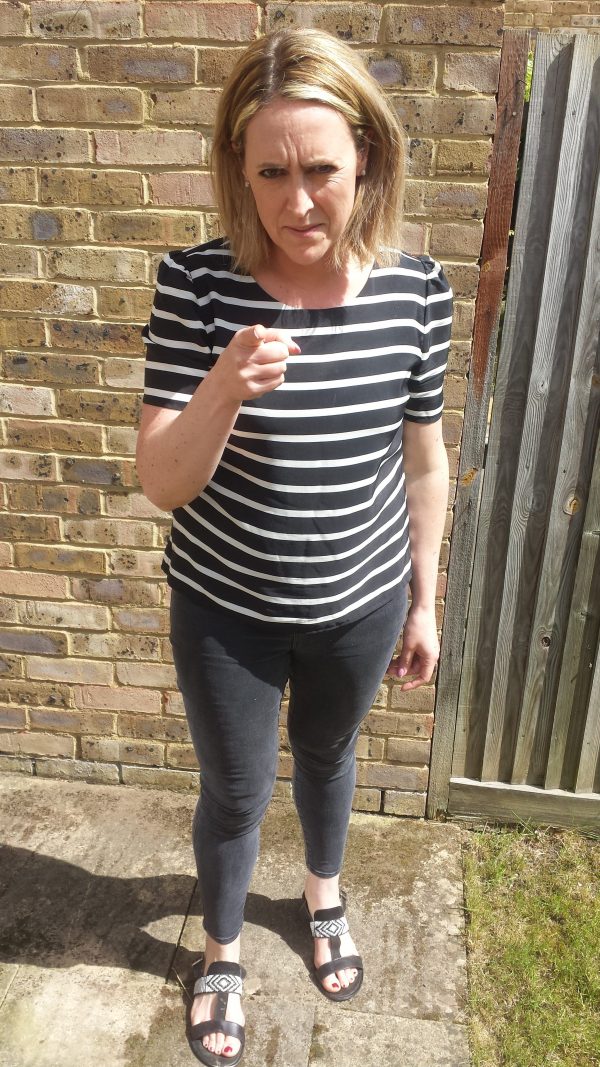
by Michael | May 11, 2018 | Blog
Sadly, couples are not always free to marry as they please. Very often they encounter opposition from their family. I know one mother who threatened to boycott the wedding (taking her whole family with her) because the couple had not opted for her chosen celebrant! It makes one wonder whose wedding it actually is.
The most common reason for opposing the wedding is disapproval of the new spouse. Perhaps he/she is not of the “correct” social class or colour. Maybe it’s a question of his/her sexuality. The truth may well be disguised, with a pretext such as “he/she isn’t worthy of you” or “they won’t be able to support you.”
The guest list
All weddings face the inevitable question: whom do you invite? It’s a tough one to answer at the best of times. You will probably start with close family and friends, but what if your closest relatives oppose your union?
Do you still include them?
Rejecting the rejectors
Do you decide to leave them out and just opt for your friends and (supportive) relations? After all, do you want negative people at your big day? They might bring the mood down – and, at worst, cause trouble.
Certainly, you’ll think twice before inviting people openly hostile to your union. On the bright side, they might decline and at least you’ll have gained kudos by having extended the olive branch!
Another olive branch
Another benefit that could accrue from inviting disapproving relatives is that they might, despite their own prejudices, attend and actually enjoy your tasteful and personalised ceremony. Wouldn’t that be something if you were able to ‘convert’ them and retain – even develop – a relationship with them?!
For many of us, there is the bond of love that unites us with our families. We may not always like our relations, but to upset and potentially do without them for the rest of our lives is not always desirable. Giving them a chance to stay connected with you (even loosely) is worth the effort.
If the worst comes to the worst, at least you’ll know you tried. And if it brings you together, couldn’t that be precious?
Come what may, your wedding will be a commemoration of love, with promises for the future. It’s not the day to heal rifts, but it may be the pathway to do so, and that is something which should be embraced.
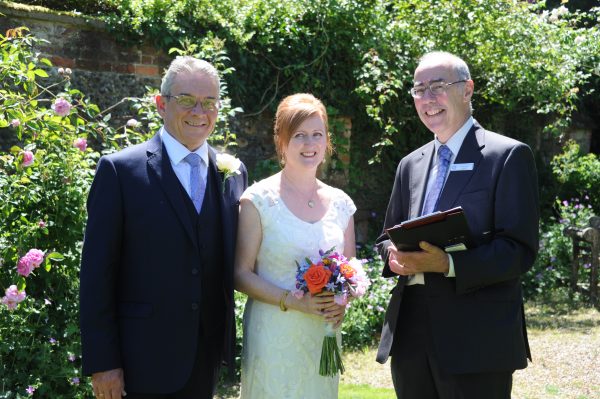
by Michael | Apr 16, 2018 | Blog
A lot of people ask me how I got into this profession. Most of them hadn’t heard of a civil celebrant before meeting me. In truth, I hadn’t heard the name either up until about six years ago.
So I had certainly never intended to become a civil celebrant!
Fate moves in mysterious ways.
Actually, if it hadn’t been for 400 prostitutes, I would never have known about the profession!
You may be feeling confused at this stage. But don’t get me wrong, please. Although I am still an active man, swimming is my main sporting activity!
So what’s this got to do with the prostitutes?
I had gone to a networking meeting, which featured a speaker. I didn’t know the title, which involved “400 prostitutes”. I just turned up. Well, I might have known the title, but had always planned to attend, you understand …!
Apparently, the speaker had considerable experience with prostitutes. He had made a fortune many years back by selling answering machines to a niche market nobody had tapped before: prostitutes!
After the presentation, I had a chat with him. It was an innocent chat, by the way! It turned out that he was a celebrant.
He told me that he helped people who wanted a ceremony that was bespoke – not formulaic. He worked with them to construct a ceremony that would mean the most to them (and, hopefully, their guests). It could be religious, semi-religious, non-religious – anything. It could be held anywhere – perhaps a licensed religious building, a hotel, a beach or a mountain top.
The ceremonies would be religious, or not, or partly so. They ranged from weddings, same-sex, vow renewals, baby-naming to handfastings. [No, I didn’t know what handfastings were at the time, either!]
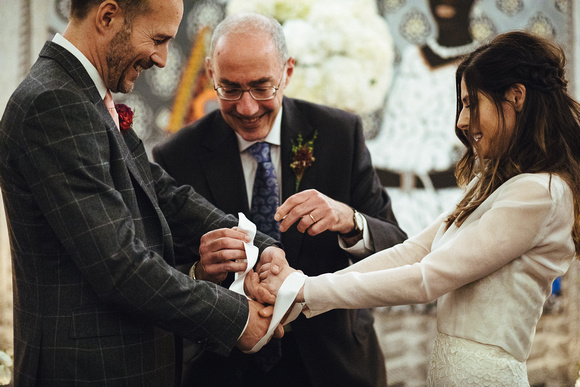
Anyway, as I listened, I got drawn in. This was something different, this was exciting, this was something I could do well. I do engage with individuals – I listen well, write well and present well – the three major skills required! Here was something that would enable me to make a difference to others.
When could I start?!
Well, I trained late in 2012, and was sufficiently enthused that I then trained to become a funeral celebrant. Since then, I have conducted well over 100 ceremonies of different kinds – even one in Cyprus!

Who’d have thought that 400 prostitutes would have made such a difference in my life!

by Michael | Apr 13, 2018 | Blog
Garden ceremonies. Are they a good thing?
You’re taking something of a gamble, if you arrange an outdoor ceremony in the UK. Of course, you can get rain in Spain (though not usually in the Summer), and there are occasional lovely days even in the UK!
Be that as it may, people are increasingly opting for home or garden ceremonies. There are ways to make planning the occasion less stressful.
It should go without saying that your celebrant will plan the actual ceremony with you in advance as well as, on the day, meeting with participants, to confirm their roles.
So we can take that part of the arrangements for granted.
The Venue
You will obviously need a suitable-sized room or garden to accommodate the number of guests you are inviting. What sort of Plan B do you have in the event of bad weather?
You will need to consider the age and health of your guests, and the length of the ceremony. You will need adequate chairs, at least for disabled and/or elderly guests. Consider wheelchair access, if appropriate.
You might need to provide cover from sun (or rain!), at least for the main protagonists. Have cool drinks ready, if it’s a hot day. Don’t forget that you may need to make a table available to be used during the ceremony.
Ensure everything is laid out well in advance of the first guests’ arrival.
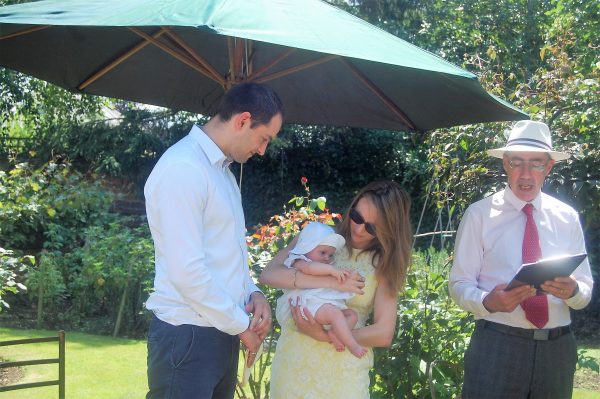
Disturbance
When you hold a ceremony outdoors, factors may enter into the equation over which you have limited – or no – control. There is the risk of all manner of disturbances, such as aircraft, lawnmowers, animals, neighbours etc.
You can ensure that your pets are shut away, if they are likely to disturb the ceremony. You may be able to liaise with neighbours. Warn them that there will be a lot of cars parking nearby on the day and explain that you would appreciate quiet for about half an hour from a certain time. (Inviting them to attend may be clever psychology!)
If you are expecting disturbances (eg you are on a flight path), it may be better to hold the ceremony inside.
Alcohol should not be served before the end of the ceremony. There is nothing worse than rowdy guests spoiling the atmosphere!
If laying out chairs, try and leave some at the back for latecomers. If VIP guests are late, it may be possible to delay the ceremony (at the celebrant’s discretion). Avoid leaving guests exposed unnecessarily long to whatever the climate is doing – or keeping children fidgeting too long.
Health & Safety
Yes, the boring bits!
Your domestic insurance will need to cover third party liability to visitors.
You’ll have to ensure entrances/exits are clear and safe, and that any garden structures (eg marquee) are safe and secure. Electrical equipment must be safe, with no trailing wires/cables. Water features should be treated as a hazard.
Holding a ceremony at home usually works out cheaper than holding it at a venue like a hotel. However, it probably loses out as regards stress. Apart from all I’ve already mentioned, there’s the catering (and logistics etc.) after the ceremony to be considered. An event planner will take away the stress, but will obviously hike the cost up.
There’s quite a lot to bear in mind, but with garden ceremonies can come the most amazing atmosphere. With planning and consideration, there is no reason why you cannot hold a truly memorable ceremony at your home.

by Michael | Apr 13, 2018 | Blog
Your big day should be exactly that. So you should have the major input into who does what, where and when. It is your day, after all.
Religious
Why have your wedding in Church just because your parents insist? Religion may mean little or nothing to you. Moreover, you may prefer a rather less regimented affair.
Register Office
Most people assume that the only alternative is a Register Office wedding. If we’re honest about it, there’s something of the conveyor-belt about that. It can be sterile and mundane. Certainly not a very special or memorable way to mark your big day!
There is another path. How about this for an idea?
Another path
Make an appointment and go to the Register Office. It could be in the morning of your big day or the day(s) before. Turn up in your jeans, if you want, with two witnesses, and have the legal bit done. Then, afterwards, with the legal formalities over and done with, enjoy a celebrant-led ceremony in the venue of your choice. And when I say “of your choice”, you can actually be quite creative.
Venue
Climate may play its part, especially in the UK, but outdoors (gardens, beaches, moors) is certainly an option. So are stately homes, boats and plush hotels or more modest, but characterful, venues.
Celebrant
If you work with a celebrant, you can construct a wonderful ceremony. There may be no religion in it or just a dash (to keep the more conservative guests happy!) or even a combination of cultural religious elements.
You can decide what readings or poems to put in – and who is going to read them. The music programme is down to you, as is the dress code. Again, working with the celebrant, you can choose to have certain rituals included (maybe a handfasting, or drinking from a Loving Cup, or burning a Unity candle, for example).
So you and the celebrant can build a most meaningful and unforgettable ceremony that guests as well as you will remember and treasure.
You really don’t need to have the wedding you don’t really want!








